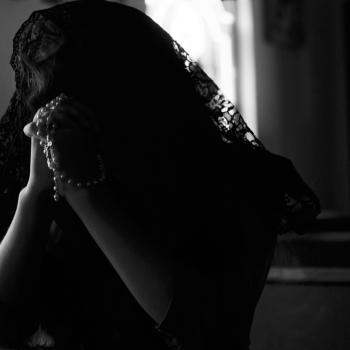Lectionary Reflections
Ruth 1:1-18
Sunday, November 1, 2015
Because the wonderful book of Ruth is a story, I thought that today and next week I would tell the story myself in my own way, allowing the text itself to guide my telling. I hope this way of presenting this timeless tale will spark your own grappling with it, possibly in new ways.
Long ago, in the days when the Judges ruled over Israel, a time when everyone did what was right in their own eyes, when left-handed Benjaminites murdered fat Moabite kings, when military leaders vowed to murder the first thing that came out of his house in order to ensure victory, when strong, long-haired, so-called heroes killed more people by dying than living, a terrible famine came on the land. Not that a famine was so unusual in a land with intermittent rain and plagues of locusts and rocky soil. As a result of this famine, a man from Bethlehem (a name that ironically means "house of food") left that land and took his family, wife and two sons, to Moab to live. Now, Israelites and Moabites were not the best of friends. After all, when Noah's two daughters determined to repopulate the land after the devastation of Sodom and Gomorrah, they chose the only man around to do so, dear old dad. And one of the progeny of these incestuous trysts was named Moab — that tells you what some Israelites thought of Moabites, not high on their list of loves. Nevertheless, the family went to Moab, east of Israel, and much higher in elevation, with the hope of food. The man was Elimelech ("my God is king"), his wife Naomi ("pleasant"), and his two sons, Mahlon and Chilion (not sure what either of those names mean).
Now another famine hits the family; Elimelech dies, leaving Naomi a foreign widow. Being a widow in the modern world is no easy thing, but becoming one in the ancient world was little less than disaster. A woman without a man was disconnected from the society, possessing few rights to the goods and service of the culture. This was especially difficult for a woman coming from another country. Well, at least Naomi had her two sons to aid her in her widowhood. After some time the two boys marry Moabite girls, one named Orpah (yes, Oprah Winfrey's name comes from a misapprehension of this name) and the other Ruth. But horror of horrors, both sons die, too, and now we are left with three widows, one who is a foreigner, and two of whom are childless. Talk about a famine!
Naomi decides that there is no future for her in Moab, especially when she hears that the famine has finally, after ten years, ended in her homeland. So, she set out from Moab to return westward to the land of Israel. Her two daughters-in-law determined to go with her, apparently being dutiful and faithful women. But Naomi will have none of it. She sternly charges the girls to go back home. "Go, return each of you to your mother's house. May YHWH make for you chesed (steadfast, unbreakable love) just as you have made with the dead and with me. YHWH grant that you find rest and security, each of you in the house of your husband." This is a lengthy and quite clear demand for the two women to leave Naomi alone, however pleasantly and piously the words are couched. She obviously imagines that the girls will take the obvious hint and turn around and head home. She kisses them both, and all three weep, as we would expect. Then Naomi turns to leave.
But no! Surprisingly, both women exclaim, "We will return with you to your people!" Naomi is having none of it. "Turn back, my daughters! Why would you go with me? Do I still have sons in my womb that they might become your husbands? Turn back, my daughters; I am too old to have a husband!" Naomi now plays the trump card of her argument that Orpah and Ruth must go back to Moab. In Israel, you see, there is this tradition known as the Levirate marriage. You may find its details laid out in Deuteronomy 25, but in short what it means is that in the case of the death of a male, a near relative, brother, uncle, cousin, must marry the widow in order to keep the male line alive. It is a deeply patriarchal tradition, designed to ensure the ongoing existence of a family by way of its males. As a side note, it does help to keep a widow connected to the community, but only through the power of a man. By employing this tradition, Naomi implies that she has no male relatives who might conceivably serve as husbands for her widowed daughters-in-law. She carries her argument to its absurd conclusion.
"Even if I thought there was any hope for me, even if I should have a husband this very night, some passing stranger willing to hitch himself to an aging widow (fat chance!), and even if I should be able to bear some sons to this man (highly unlikely to say the least!), would you two wait until they were grown up (absurd!)? Would you not marry someone in the intervening sixteen or so years? Why, if you waited, you would be long in the tooth, past childbearing yourselves, and the male line would disappear from the land. No, my daughters, it has been far more bitter for me than for you that the hand of YHWH has turned against me." Then they all wept again, but this time Orpah saw the light, turned around and hitched a ride straight back to Moab.





